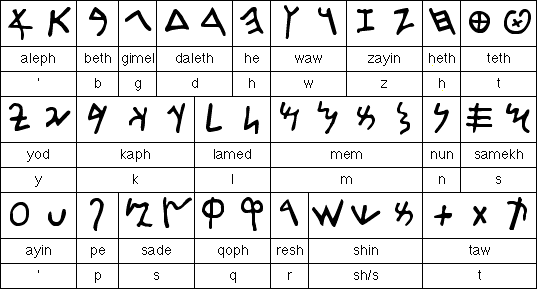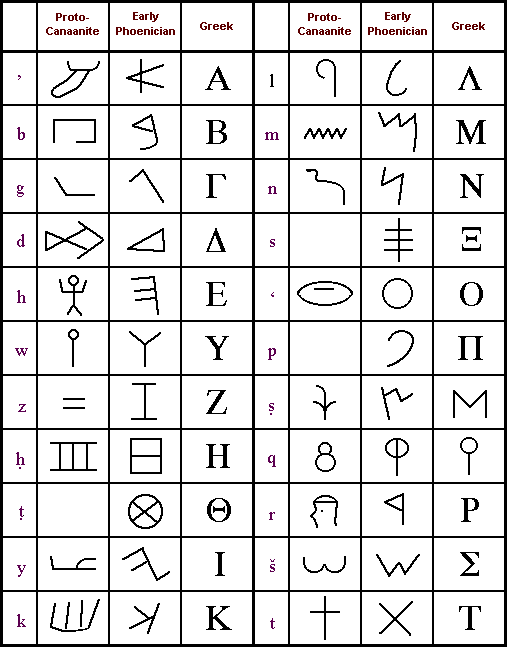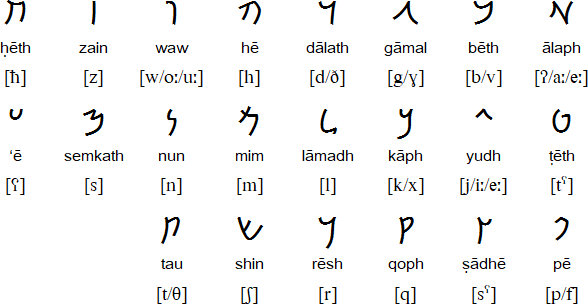1 posted on
11/14/2005 1:25:31 PM PST by
blam
To: SunkenCiv
2 posted on
11/14/2005 1:26:03 PM PST by
blam
To: blam
looks like an interesting read
bump for later
3 posted on
11/14/2005 1:28:23 PM PST by
Zeppelin
(Stop Global Warming. Shut a Liberal's Mouth.)
To: blam
If one is to believe that primal urges would be the first ones to get expressed, then the oldest inscriptions would be [by content] not alphabets but what we would now see as graffiti, of more or less unprintable nature.
5 posted on
11/14/2005 1:35:01 PM PST by
GSlob
To: Lurking Libertarian
pingtika
6 posted on
11/14/2005 1:37:07 PM PST by
BibChr
("...behold, they have rejected the word of the LORD, so what wisdom is in them?" [Jer. 8:9])
To: blam
7 posted on
11/14/2005 1:38:12 PM PST by
mosquitobite
(What we permit; we promote.)
To: blam
Since I never subscribed to the theory of evolution, I believe man's immediately-created intelligence allowed a written language to begin very rapidly. And probably the first letter ever written was by a woman reminding her hunter/gatherer man that he'll be sleeping on the rock bed unless he comes home with plush red fox fur instead of dull gray wolf. :o)
8 posted on
11/14/2005 1:49:25 PM PST by
TheCrusader
("The frenzy of the Mohammedans has devastated the churches of God" -Pope Urban II, 1097AD)
To: american colleen; Lady In Blue; Salvation; narses; SMEDLEYBUTLER; redhead; Notwithstanding; ...
 PHOENICIAN ALPHABET
PHOENICIAN ALPHABET
Comparison between the Proto-Canaanite, Phoenician, and Greek alphabets.
 Proto-Hebrew/Early Aramaic alphabet
Proto-Hebrew/Early Aramaic alphabet
What this all means? I don't have a clue, but I'm guessing we'll see a lot of arguments breaking out over it. Regardless, it's quite interesting :-)
Catholic Ping
Please freepmail me if you want on/off this list

12 posted on
11/14/2005 3:29:31 PM PST by
NYer
(“Socialism is the religion people get when they lose their religion")
To: Just mythoughts
To: blam
Great find. Thanks for posting it.
20 posted on
11/14/2005 7:12:39 PM PST by
Colorado Doug
(Diversity is divisive. E. Pluribus Unum (Out of many, one))
To: blam
This site seems to be a couple of miles east or NE of Kiryat Gat, which appears to be at or near the site of the Philistine city of Gath, the home town of Goliath. I doubt you can tell from someone writing the alphabet in order what his religion was, whether he was an Israelite of the tribe of Judah, or a Philistine.
In Acts 8.26 there is a reference to the road that runs from Jerusalem to Gaza. That apparently ran a few miles south of Tel Zayit.
To: blam
26 posted on
11/14/2005 9:36:16 PM PST by
SunkenCiv
(Down with Dhimmicrats! I last updated my FR profile on Wednesday, November 2, 2005.)
Epigraphy and Language
|
A Is for Ancient, Describing an Alphabet Found Near Jerusalem
|
| |
Posted by saquin
On News/Activism 11/08/2005 8:48:19 PM PST · 29 replies · 514+ views
New York Times | 11/9/05 | John Noble Wilford
In the 10th century B.C., in the hill country south of Jerusalem, a scribe carved his A B C's on a limestone boulder - actually, his aleph-beth-gimel's, for the string of letters appears to be an early rendering of the emergent Hebrew alphabet. Archaeologists digging in July at the site, Tel Zayit, found the inscribed stone in the wall of an ancient building. After an analysis of the layers of ruins, the discoverers concluded that this was the earliest known specimen of the Hebrew alphabet and an important benchmark in the history of writing, they said this week. If they...
|
|
|
Israelite Alphabet May Have Been Found
|
| |
Posted by anymouse
On News/Activism 11/09/2005 5:11:58 PM PST · 29 replies · 658+ views
Associated Press | 11/09/04
Two lines of an alphabet have been found inscribed in a stone in Israel, offering what some scholars say is the most solid evidence yet that the ancient Israelites were literate as early as the 10th century B.C. "This is very rare. This stone will be written about for many years to come," archaeologist Ron E. Tappy, a professor at the Pittsburgh Theological Seminary who made the discovery, said Wednesday. "This makes it very historically probable there were people in the 10th century (B.C.) who could write." Christopher Rollston, a professor of Semitic studies at Emmanuel School of Religion in...
|
|
27 posted on
11/14/2005 9:37:15 PM PST by
SunkenCiv
(Down with Dhimmicrats! I last updated my FR profile on Wednesday, November 2, 2005.)
FreeRepublic.com is powered by software copyright 2000-2008 John Robinson


 Proto-Hebrew/Early Aramaic alphabet
Proto-Hebrew/Early Aramaic alphabet 